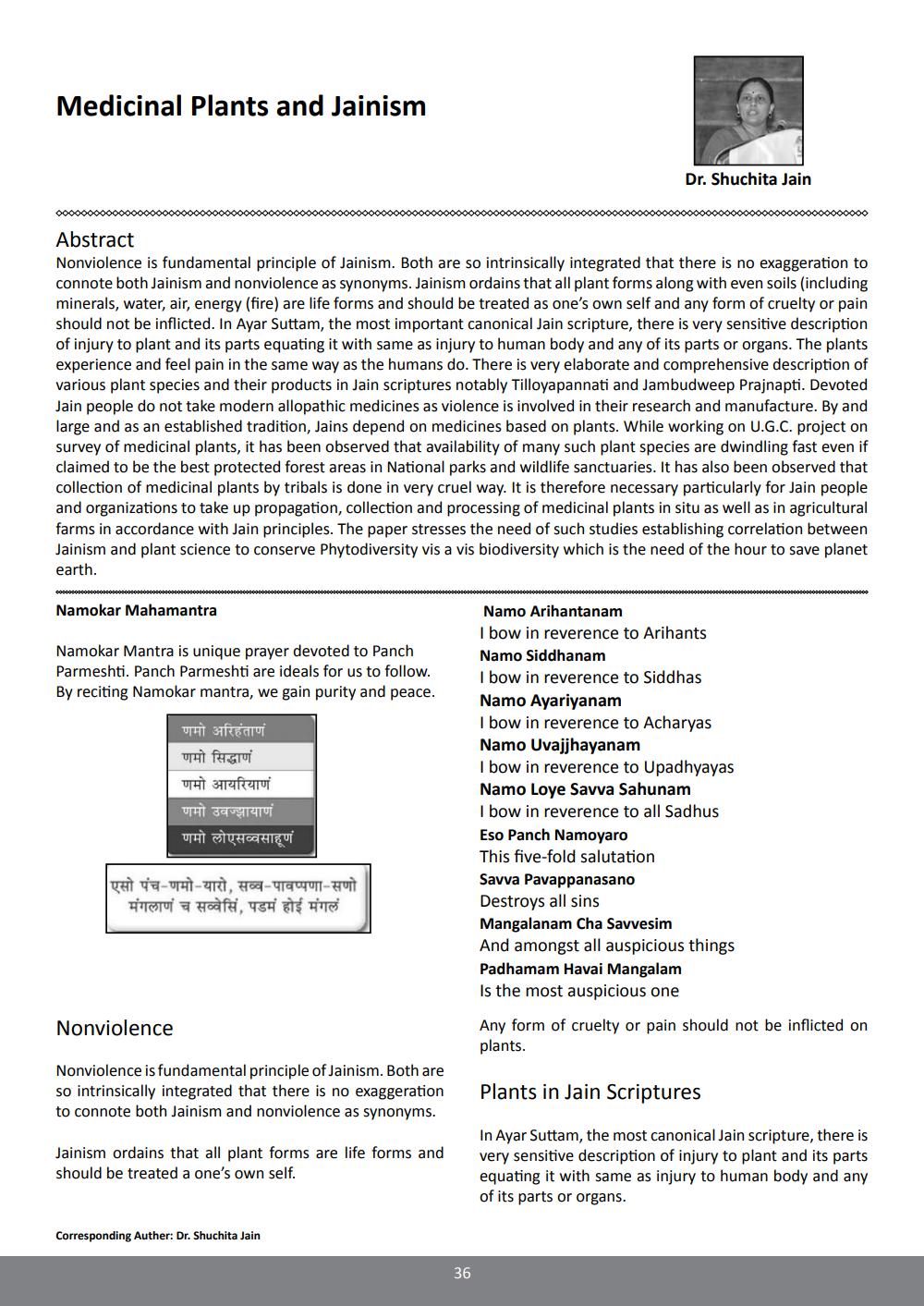________________
Medicinal Plants and Jainism
Dr. Shuchita Jain
0000000000000000000000000
000000
000000000000000oooooooooo
00000000000000000000oooooooooooooo000000000 Abstract Nonviolence is fundamental principle of Jainism. Both are so intrinsically integrated that there is no exaggeration to connote both Jainism and nonviolence as synonyms. Jainism ordains that all plant forms along with even soils (including minerals, water, air, energy (fire) are life forms and should be treated as one's own self and any form of cruelty or pain should not be inflicted. In Ayar Suttam, the most important canonical Jain scripture, there is very sensitive description of injury to plant and its parts equating it with same as injury to human body and any of its parts or organs. The plants experience and feel pain in the same way as the humans do. There is very elaborate and comprehensive description of various plant species and their products in Jain scriptures notably Tilloyapannati and Jambudweep Prajnapti. Devoted Jain people do not take modern allopathic medicines as violence is involved in their research and manufacture. By and large and as an established tradition, Jains depend on medicines based on plants. While working on U.G.C. project on survey of medicinal plants, it has been observed that availability of many such plant species are dwindling fast even if claimed to be the best protected forest areas in National parks and wildlife sanctuaries. It has also been observed that collection of medicinal plants by tribals is done in very cruel way. It is therefore necessary particularly for Jain people and organizations to take up propagation, collection and processing of medicinal plants in situ as well as in agricultural farms in accordance with Jain principles. The paper stresses the need of such studies establishing correlation between Jainism and plant science to conserve Phytodiversity vis a vis biodiversity which is the need of the hour to save planet earth.
Namokar Mahamantra
Namokar Mantra is unique prayer devoted to Panch Parmeshti. Panch Parmeshti are ideals for us to follow. By reciting Namokar mantra, we gain purity and peace.
णमो अरिहंताणं णमो सिद्धाणं णमो आयरियाणं णमो उवज्झायाण णमो लोएसव्वसाहूणं
Namo Arihantanam I bow in reverence to Arihants Namo Siddhanam I bow in reverence to Siddhas Namo Ayariyanam I bow in reverence to Acharyas Namo Uvajjhayanam I bow in reverence to Upadhyayas Namo Loye Savva Sahunam I bow in reverence to all Sadhus Eso Panch Namoyaro This five-fold salutation Savva Pavappanasano Destroys all sins Mangalanam Cha Savvesim And amongst all auspicious things Padhamam Havai Mangalam Is the most auspicious one
|एसो पंच-णमो-यारो, सव्व-पावप्पणा-सणो
मंगलाणं च सव्वेसिं, पडम होई मंगलं
Nonviolence
Any form of cruelty or pain should not be inflicted on plants.
Nonviolence is fundamental principle of Jainism. Both are so intrinsically integrated that there is no exaggeration to connote both Jainism and nonviolence as synonyms.
Plants in Jain Scriptures
Jainism ordains that all plant forms are life forms and should be treated a one's own self.
In Ayar Suttam, the most canonical Jain scripture, there is very sensitive description of injury to plant and its parts equating it with same as injury to human body and any of its parts or organs.
Corresponding Auther: Dr. Shuchita Jain
36




